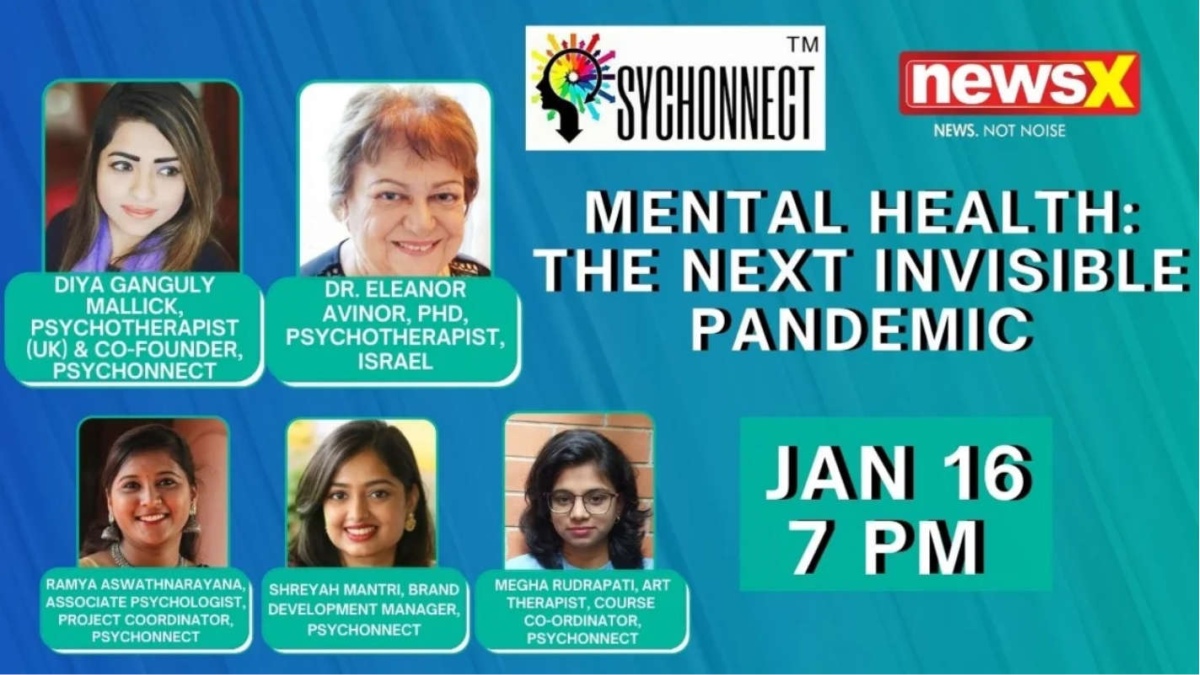


As the world battles a ravaging pandemic, in an exclusive conversation with NewsX, Psychonnect held a riveting discussion on ‘Mental Health: The Next Invisible Pandemic’. The expert panellists were Diya Ganguly Mallick, psychotherapist (UK) and co-founder, Psychonnect, and Dr Eleanor Avinor, PhD and psychotherapist (Israel), and the audience included Ramya Aswathnarayana, associate psychologist and project coordinator, Psychonnect, Megha Rudrapati, art therapist and course coordinator, Psychonnect, and Shreyah Mantri, brand development manager, Psychonnect.
Addressing the various challenges of mental health, Diya said, “The problem with mental health is we don’t understand its pain points and triggers. Slowly it’s going to enter inside your body but one will still not know about it or understand its concern because it’s not tangible, it’s not visible. That is why as a professional, we want to raise awareness on the subject. To understand the wide spectrum mental health challenges can have, be it occasional instances of anger or the existential crisis of depression, these all fall under the realm of mental health. The work we are doing at Psychonnect is creating awareness for people to understand that this is a serious issue and there is no health without mental health.”
Psychonnect is a premier mental health platform that facilitates mental well-being, diagnostics, counselling, and therapy service. Talking about the thought behind founding the organisation, she said, “In the UK I had an opportunity to create an ecosystem that will merge the traditional approaches we have in India with empirical approaches of the West so that people can have a holistic treatment and get more awareness globally. We need more professionals to equip them with the right skills to go out and train people and address this issue unless and until we reach a stage where everybody is at least aware of their mental health and well-being.”
Dr Eleanor shared her insights on the mental challenges owing to the pandemic that we as a global community experienced, “Nowadays, stress and anxiety are everywhere and everybody has them. We need to know how to lower it, and how to understand what triggers us. Therefore, psychotherapy is important and it can help everybody. Violence in the family or the whole world is one of the main points that we deal with. Typically, a third of the world population is suffering from anxiety, depression, anger, or loneliness. It’s contagious and people are feeling upset especially because of the social distancing. People don’t have the contact that they want.”
Stressing on the fears that people have while seeking professional help and how stigmatised mental health issues continue to be, she elaborated “Many people don’t get help as they are afraid of the stigma. Others don’t have the money, sometimes it is expensive to get professional help, and sometimes there is no professional solution available. We’re trying to prepare professional solutions where anybody can go and get help. People have to feel accepted to be happy and everybody needs some sort of psychological help. People need somebody to discuss their problems with and they need help to look at their problems and dilemmas from a different perspective positively and effectively. We have patterns that we’ve learned as babies and we’re connected to these patterns. Sometimes they don’t work for us but they worked when we were babies. We have to learn to look at these patterns of behaviour, the way of thinking we have, and maybe change them.”
Talking about how it is possible to come up with a large scale of the pattern and the individual context in mental health and generalise something at that scale, Dr Eleanor shared insights from her professional experiences, “Not everything is biochemical. Our thoughts determine how we feel, and how we feel determines how we behave. We have to be giving you the thoughts and that’s not medicine. There are medical solutions for people who have schizophrenia or maybe manic depressive disorders that need medication. While some people need medication but many people need medication with psychotherapy and talking. I worked in a hospital for many years in the Psychiatric Unit. We had many clients, some of them received medication, we only talked to some of them while others received both. People need to talk.”
Taking steps to make mental well-being a lifestyle statement Psychonnect has come up with A-R-K (Awareness – Recognition – Knowledge) Charter which can be a self-healing tool for everybody. Throwing light on how ARK Charter aims to take the first steps towards understanding, appreciating, and respecting the relevance and importance of mental health and well-being, Diya told us, “Whether it’s depression, anxiety, trauma, or PTSD, you can visit our website, talk, and express your concerns. At the same time, we are building a PR network and support groups where we are bringing people who already have a history of mental illness so that they can share their experiences and people can learn from it.”
Ramya spoke about how to grasp the mental health challenges of children of various ages during pandemic who might not be able to self-diagnose. Dr Elenor said it’s important to see and understand how our children feel and that everybody needs somebody to love. Diya further added that it is crucial to understand that because of the Covid-19 related trauma it might be difficult for any child to express his/her concerns. “Children are usually attached to a routine of going to school, meeting friends, sitting in a particular classroom, and you’ve taken all those pleasures out of their lives and introduced a new form of learning, interacting with friends. This can be overwhelming, and they might not necessarily know what is stressing them out. For that reason, parents can spend some quality time with them, maybe go through family pictures and engage them in small things and perhaps through that you can tap into what is going on in their heads.”